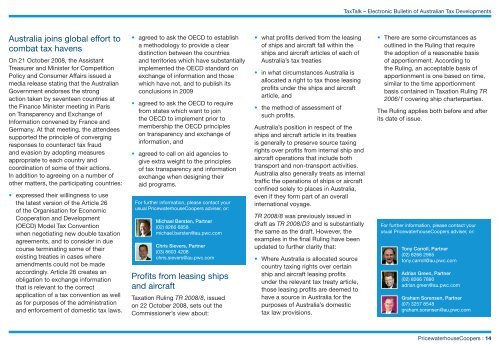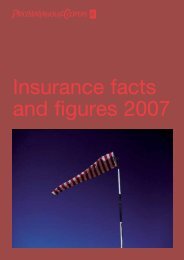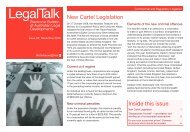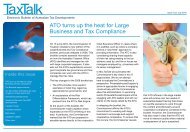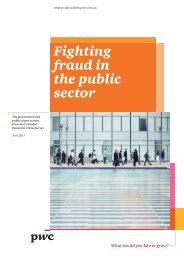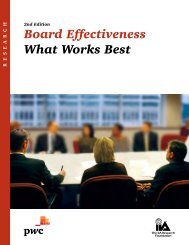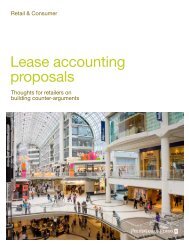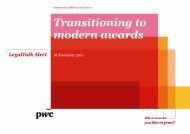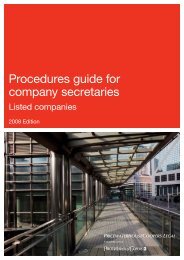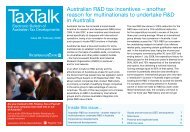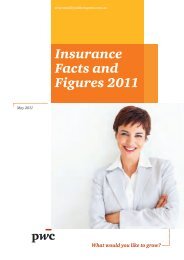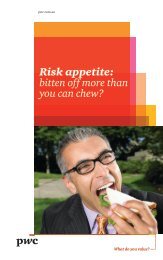Thin capitalisation: eroding asset values and increasing debt ... - PwC
Thin capitalisation: eroding asset values and increasing debt ... - PwC
Thin capitalisation: eroding asset values and increasing debt ... - PwC
Create successful ePaper yourself
Turn your PDF publications into a flip-book with our unique Google optimized e-Paper software.
TaxTalk – Electronic Bulletin of Australian Tax Developments<br />
Australia joins global effort to<br />
combat tax havens<br />
On 21 October 2008, the Assistant<br />
Treasurer <strong>and</strong> Minister for Competition<br />
Policy <strong>and</strong> Consumer Affairs issued a<br />
media release stating that the Australian<br />
Government endorses the strong<br />
action taken by seventeen countries at<br />
the Finance Minister meeting in Paris<br />
on Transparency <strong>and</strong> Exchange of<br />
Information convened by France <strong>and</strong><br />
Germany. At that meeting, the attendees<br />
supported the principle of converging<br />
responses to counteract tax fraud<br />
<strong>and</strong> evasion by adopting measures<br />
appropriate to each country <strong>and</strong><br />
coordination of some of their actions.<br />
In addition to agreeing on a number of<br />
other matters, the participating countries:<br />
• expressed their willingness to use<br />
the latest version of the Article 26<br />
of the Organisation for Economic<br />
Cooperation <strong>and</strong> Development<br />
(OECD) Model Tax Convention<br />
when negotiating new double taxation<br />
agreements, <strong>and</strong> to consider in due<br />
course terminating some of their<br />
existing treaties in cases where<br />
amendments could not be made<br />
accordingly. Article 26 creates an<br />
obligation to exchange information<br />
that is relevant to the correct<br />
application of a tax convention as well<br />
as for purposes of the administration<br />
<strong>and</strong> enforcement of domestic tax laws.<br />
• agreed to ask the OECD to establish<br />
a methodology to provide a clear<br />
distinction between the countries<br />
<strong>and</strong> territories which have substantially<br />
implemented the OECD st<strong>and</strong>ard on<br />
exchange of information <strong>and</strong> those<br />
which have not, <strong>and</strong> to publish its<br />
conclusions in 2009<br />
• agreed to ask the OECD to require<br />
from states which want to join<br />
the OECD to implement prior to<br />
membership the OECD principles<br />
on transparency <strong>and</strong> exchange of<br />
information, <strong>and</strong><br />
• agreed to call on aid agencies to<br />
give extra weight to the principles<br />
of tax transparency <strong>and</strong> information<br />
exchange when designing their<br />
aid programs.<br />
For further information, please contact your<br />
usual PricewaterhouseCoopers adviser, or:<br />
Michael Bersten, Partner<br />
(02) 8266 6858<br />
michael.bersten@au.pwc.com<br />
Chris Sievers, Partner<br />
(03) 8603 4208<br />
chris.sievers@au.pwc.com<br />
Profits from leasing ships<br />
<strong>and</strong> aircraft<br />
Taxation Ruling TR 2008/8, issued<br />
on 22 October 2008, sets out the<br />
Commissioner’s view about:<br />
• what profits derived from the leasing<br />
of ships <strong>and</strong> aircraft fall within the<br />
ships <strong>and</strong> aircraft articles of each of<br />
Australia’s tax treaties<br />
• in what circumstances Australia is<br />
allocated a right to tax those leasing<br />
profits under the ships <strong>and</strong> aircraft<br />
article, <strong>and</strong><br />
• the method of assessment of<br />
such profits.<br />
Australia’s position in respect of the<br />
ships <strong>and</strong> aircraft article in its treaties<br />
is generally to preserve source taxing<br />
rights over profits from internal ship <strong>and</strong><br />
aircraft operations that include both<br />
transport <strong>and</strong> non-transport activities.<br />
Australia also generally treats as internal<br />
traffic the operations of ships or aircraft<br />
confined solely to places in Australia,<br />
even if they form part of an overall<br />
international voyage.<br />
TR 2008/8 was previously issued in<br />
draft as TR 2008/D3 <strong>and</strong> is substantially<br />
the same as the draft. However, the<br />
examples in the final Ruling have been<br />
updated to further clarity that:<br />
• Where Australia is allocated source<br />
country taxing rights over certain<br />
ship <strong>and</strong> aircraft leasing profits<br />
under the relevant tax treaty article,<br />
those leasing profits are deemed to<br />
have a source in Australia for the<br />
purposes of Australia’s domestic<br />
tax law provisions.<br />
• There are some circumstances as<br />
outlined in the Ruling that require<br />
the adoption of a reasonable basis<br />
of apportionment. According to<br />
the Ruling, an acceptable basis of<br />
apportionment is one based on time,<br />
similar to the time apportionment<br />
basis contained in Taxation Ruling TR<br />
2006/1 covering ship charterparties.<br />
The Ruling applies both before <strong>and</strong> after<br />
its date of issue.<br />
For further information, please contact your<br />
usual PricewaterhouseCoopers adviser, or:<br />
Tony Carroll, Partner<br />
(02) 8266 2965<br />
tony.carroll@au.pwc.com<br />
Adrian Green, Partner<br />
(02) 8266 7890<br />
adrian.green@au.pwc.com<br />
Graham Sorensen, Partner<br />
(07) 3257 8548<br />
graham.sorensen@au.pwc.com<br />
PricewaterhouseCoopers : 14


